The monkey, one of the symbolic animals in East Asian culture, is considered a lucky, wise, and prestigious creature. As such, displaying monkey statues to enhance one’s feng shui has become a popular practice. Join us as we explore the meaning and proper use of monkey statues in feng shui.
1 The Significance of Monkey Statues in Feng Shui
Apart from being one of the 12 animals in the Can Chi calendar, the monkey holds a special place in both folklore and science. The monkey is deeply rooted in numerous folk tales and religious stories, with one of its earliest appearances being that of the “Hau.”
The Monkey Symbolizes Career Success and Prestige
The word “Hau,” which means monkey, shares the same pronunciation as the word “Hau” in feudal titles. In the ancient feudal system, the title of “Hau” was second only to “Wang” and “De” in terms of prestige and power, just below the royal family.
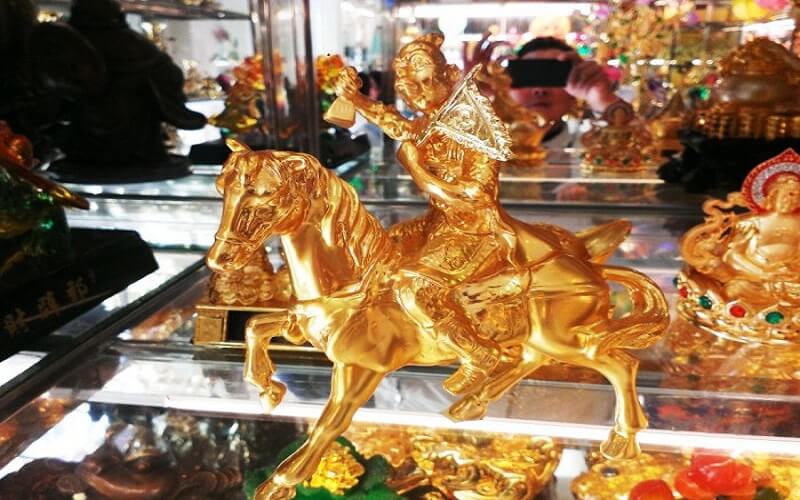 The monkey symbolizes career success, power, and prestige.
The monkey symbolizes career success, power, and prestige.
Consequently, being bestowed the title of “Phong Hau” (roughly translated as “bestowed a marquis title”) was considered a great honor. Thus, the image of a monkey came to represent career success, prestige, power, and high social status. This concept of “Phong Hau” also appears in Vietnamese history.
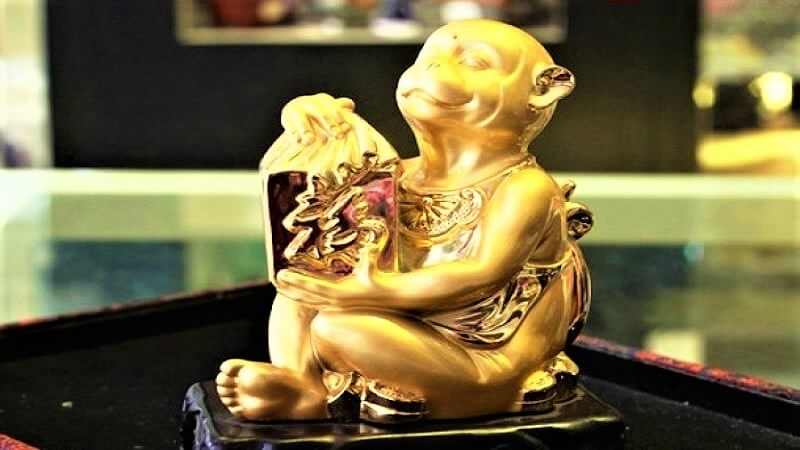 Monkey Statue
Monkey Statue
During the reign of the Le Dynasty and the Trinh Lords, when the power of the Trinh and Nguyen Lords in the South was weakening, there was a man named Dang Kim who held a prominent position in the court and had contributed greatly to the Nguyen Dynasty. As a result, he was bestowed the title of “Hau.”
Despite being granted this honor, Dang Kim yearned for the title of “Vuong” (king). He repeatedly petitioned the king to adopt him as his son so that he could become a member of the royal family.
The king agreed, and Dang Kim changed his name to Trinh An. However, on the night of his enfeoffment, someone drew a picture of a monkey lying under a large tree with the following verse:
“Oh monkey, wake up and see,
Don’t wait for the tree to fall and end your destiny.”
Around the same time, the Nguyen Dynasty was in a state of decline. This verse served as a wake-up call for Dang Kim, prompting him to immediately resign from his position and sever all ties with the court. As a result, his family was spared the turmoil of war.
The Monkey Represents Longevity
In the Chinese novel “Journey to the West,” Sun Wukong, the Monkey King, consumed the elixir of life belonging to the Supreme Elder, and devoured the peaches of immortality from Queen Mother of the West, causing a ruckus in the Underworld, all in an attempt to erase the name of the monkey from the book of life and death, ensuring immortality for himself and his monkey clan.
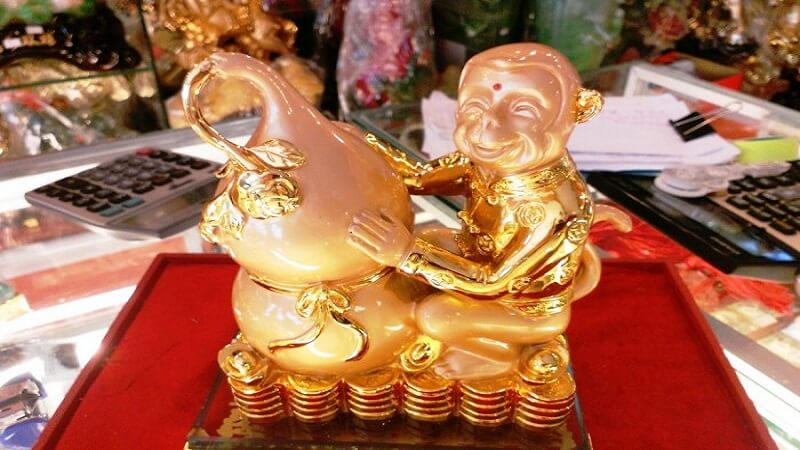 The monkey symbolizes longevity.
The monkey symbolizes longevity.
Sun Wukong’s initial motivation for seeking supernatural powers was to achieve immortality and gain infinite power to protect his clan from the cycle of life and death, which includes birth, old age, sickness, and death. Thus, the image of the monkey stealing or offering peaches symbolizes longevity, peace, and freedom from disturbances.
The Monkey is a Sacred Animal in Spirituality and Feng Shui
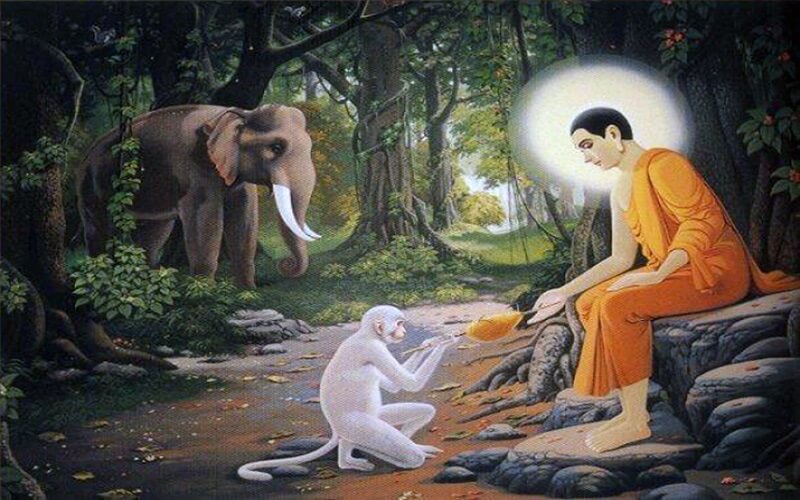 A white monkey offered a tribute to the Buddha before his enlightenment.
A white monkey offered a tribute to the Buddha before his enlightenment.
The monkey appears in the imagery of major religions, such as Buddhism. When the Buddha was sitting under the Bodhi tree and attained enlightenment, a white monkey came to pay homage to him. Additionally, in countless past lives, the Buddha was once a monkey king who used his body to create a bridge and save his monkey clan from death. In this context, the monkey represents compassion and kindness.
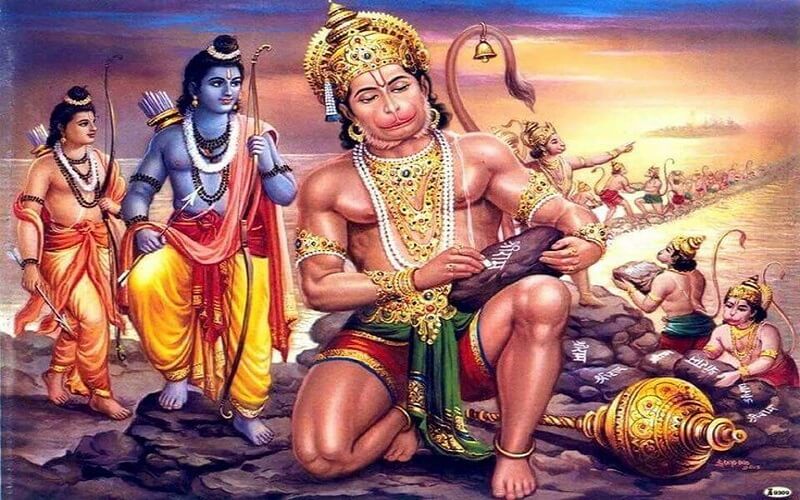 In Hinduism, the god Hanuman, a monkey holding two divine mallets, appears in the Ramayana epic.
In Hinduism, the god Hanuman, a monkey holding two divine mallets, appears in the Ramayana epic.
In Hinduism, the god Hanuman, a monkey holding two divine mallets, appears in the Ramayana epic. Hanuman symbolizes courage and strength.
 The Monkey (Shin) is compatible with the Goat (Mui), Rat (Ty), and Dragon (Than) in the Chinese zodiac.
The Monkey (Shin) is compatible with the Goat (Mui), Rat (Ty), and Dragon (Than) in the Chinese zodiac.
In spiritual culture, the monkey is considered the closest animal to humans. Therefore, it is believed to be the most spiritual of the 12 animals in the Chinese zodiac. This is evident in the Chinese novel “Journey to the West,” which highlights the intelligence of the monkey.
Thus, the monkey is a sacred animal, symbolizing not only power but also reason, wisdom, courage, strength, and kindness.
2 Proper Placement of Monkey Statues in Feng Shui
Given the positive attributes and lucky meanings associated with the monkey, it is common to decorate homes and offices with monkey statues to attract good fortune. But how should these statues be placed for the best results?
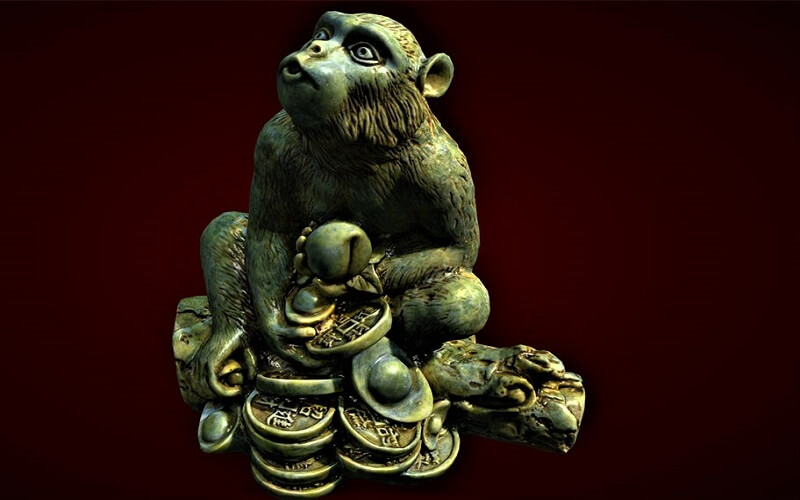 The Monkey (Shin) is compatible with the Goat (Mui), Rat (Ty), and Dragon (Than) in the Chinese zodiac.
The Monkey (Shin) is compatible with the Goat (Mui), Rat (Ty), and Dragon (Than) in the Chinese zodiac.
First, it is essential to determine if your zodiac sign is compatible with this auspicious animal. In the Chinese zodiac, the monkey is known as “Shin,” and it is compatible with the Goat (“Mui”).
According to the Five Elements theory, the signs of Shin, Ty, and Than are considered harmonious. If you belong to any of these signs, placing a monkey statue in your home or office is believed to bring smoothness, luck, and peace.
On the other hand, Dan, Ty, and Hoi are considered incompatible with Shin. If you fall under any of these signs, it is best to avoid displaying monkey statues.
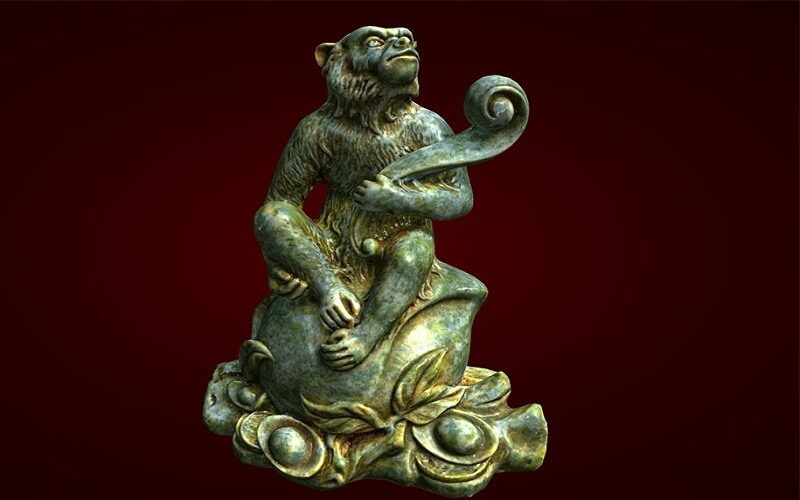 The most auspicious directions for placing monkey statues are North and Southwest.
The most auspicious directions for placing monkey statues are North and Southwest.
In terms of materials, gold-plated monkey statues symbolize wealth, power, and status, while copper statues convey similar meanings, representing prosperity and career advancement. When it comes to placement directions, there are two auspicious options:
- North: According to the Five Elements theory, the monkey governs the northern region. Therefore, it is suitable to place a monkey statue facing this direction.
- Southwest: This direction is considered extremely prosperous for the monkey. Placing a statue in this direction allows it to fully exert its feng shui values.
Note:
Avoid placing the monkey statue facing the northeast direction, as this is considered inauspicious and may bring negative influences to your feng shui..
3 Beautiful Monkey Statue Models in Feng Shui
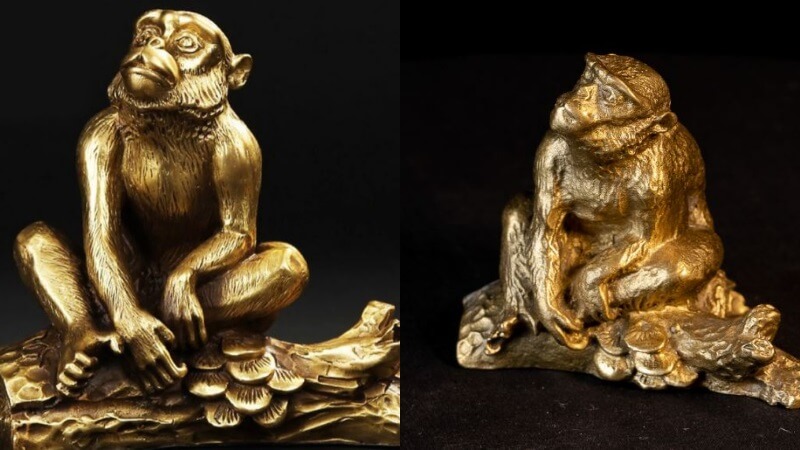 A contemplative monkey statue symbolizes wisdom and enlightenment in Buddhism.
A contemplative monkey statue symbolizes wisdom and enlightenment in Buddhism.
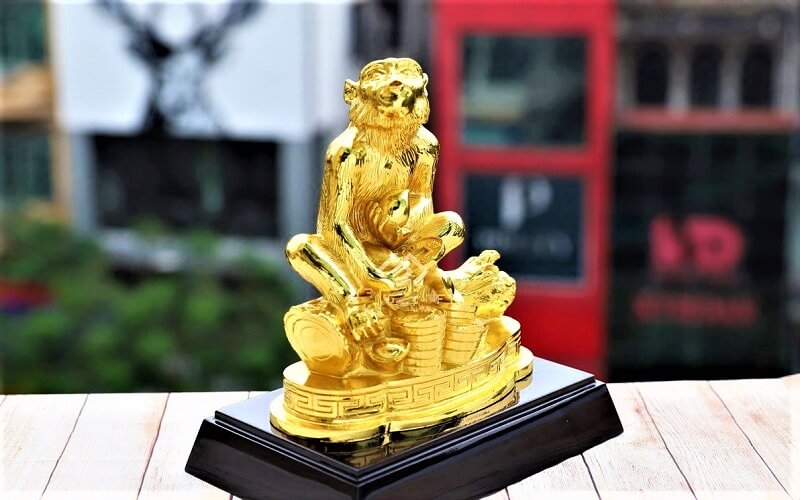 A monkey sitting on a pile of gold symbolizes wealth.
A monkey sitting on a pile of gold symbolizes wealth.
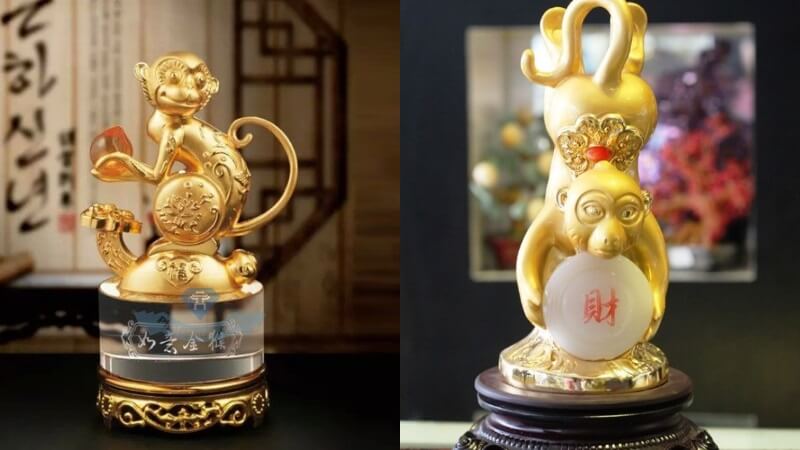 A monkey offering or stealing a peach symbolizes longevity and peace.
A monkey offering or stealing a peach symbolizes longevity and peace.
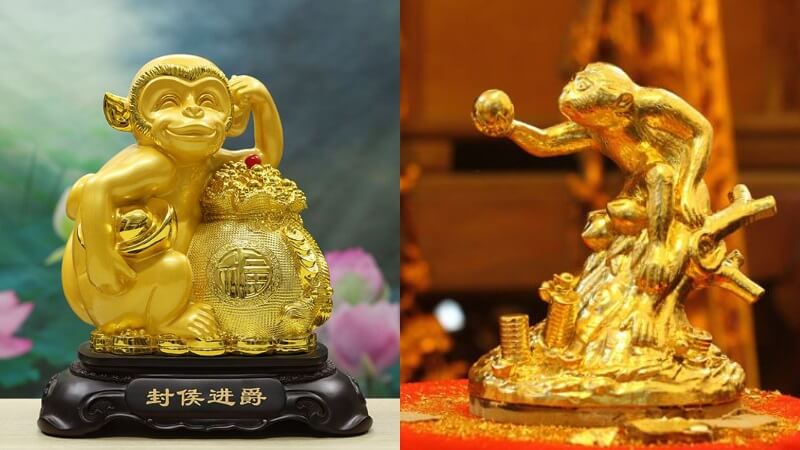 A monkey hugging a gold bar or offering a peach symbolizes good health and luck.
A monkey hugging a gold bar or offering a peach symbolizes good health and luck.
The information provided above explains the meaning and proper use of monkey statues in feng shui, helping you understand the significance of this symbolic animal in culture and daily life.
2023 Lunar New Year Gift Ideas for Older Family and Friends
As 2021 approaches, families worldwide are gathering to celebrate the special bond between grandparents and their grandchildren. To show their love and admiration, these thoughtfully chosen gifts will bring a smile to the face of the elderly. Here, we have compiled a list of the 13 most meaningful Tet presents that can bring joy to our beloved grandparents.



































